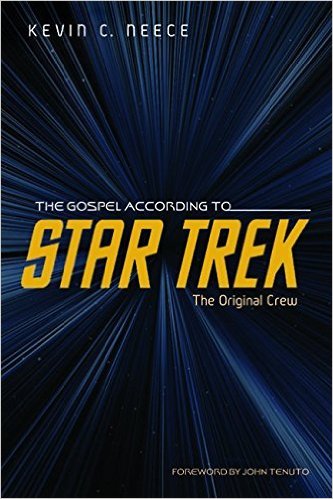The Gospel According To Star Trek, Part 1
 Kevin C. Neece, author of The Gospel According To Star Trek, agreed to answer a few interview questions for me. Because they were so few, I told him to be expansive in his answers. He was. The result is a thoughtful article that is too long for one blog post. Consequently, we’re breaking it into two. Today, the first two questions.
Kevin C. Neece, author of The Gospel According To Star Trek, agreed to answer a few interview questions for me. Because they were so few, I told him to be expansive in his answers. He was. The result is a thoughtful article that is too long for one blog post. Consequently, we’re breaking it into two. Today, the first two questions.
RLM: I understand you have a degree in Communication and Philosophy and another in Fine Arts. That sounds quite heady and literary. So, why Star Trek?
KCN: Well, in the first place, my degrees aren’t all that intimidating. We’re all philosophers to one degree or another. In fact, one of the main reasons I do the work I do is to get people who may not think of themselves much as philosophers and theologians to begin engaging these important questions and ideas of human existence. The ideas I discuss in my writing and speaking may be at home in university classrooms, but they’re things we all wonder about and wrestle with in our everyday lives.
In my book on Star Trek, I talk about the fact that many philosophers and theologians have defined humans as Homo Religiosus, essentially saying that we are an instinctively religious species in that we look for higher meaning and greater purpose in our lives. Philosophy and theology are just disciplined schools of thought that help us to explore the things we think about naturally, whether we’re looking up at the clouds or watching Star Trek.
Initially, the idea that we’re engaging in something philosophical, or even spiritual, by watching a sci-fi adventure show may seem strange, but Star Trek has always been philosophical in nature. It’s not just a show about cool-looking starships, nifty gadgets, and clever plots. It’s really about the human condition—who we are, what our place in the universe is, and where we’re going. The big questions of existence have always been the driving force behind Star Trek, so putting its TV series and films into conversation with philosophy and theology is really not that unusual.
At first, though, I didn’t really see it that way. I’ve been a Star Trek fan for nearly thirty years, but, for most of that time, I didn’t see my faith and my Christian worldview reflected in it. The first line of my book about Star Trek is, “My first step toward The Gospel According to Star Trek was walking away from Star Trek.”
When I was a senior in high school, there was a lot of Star Trek on TV, but I had a really busy life and I just got behind on episodes. And we didn’t have DVRs in those days. I had to catch reruns. I was having a hard time getting into the new series that were on and it just got to be too much for me. So, except for the films, I basically stopped watching Star Trek.
But later, in college, I took an Intro to Philosophy course that changed my whole worldview—it even introduced me to the concept of worldview! Suddenly, I wasn’t getting an education just to get a degree to get a better job in video and film. I realized that my education was about becoming a better human being and that this was an inherently spiritual pursuit.
I learned that there was no separation between the “sacred” and the “secular,” that God is at work everywhere in our human experience. It was with these new eyes that I returned to Star Trek. I saw the films and television I loved in a whole new light, and Star Trek began to inform my faith in new and exciting ways. That was the birth of The Gospel According to Star Trek.
RLM: Have you compared Star Trek with Star Wars? Do you think the two originators of those franchises were trying to accomplish the same things? If so, what? And did they both succeed?
KCN: What is this evil thing of which you speak? Star Trek and Star What, now? Star who? Star where?
 Just kidding. I love Star Wars. I’m learning to say that again after the prequel years, but in my bedroom when I was growing up, right next to my box window where I’d strung up Christmas lights to hang my Star Trek Christmas ornaments year round, there was another string of lights that trailed over to form a border around framed posters for Star Wars, The Empire Strikes Back, and Return of the Jedi. That said, I am much more of a Trekkie. The Gospel According to Star Wars is somebody else’s book. (Josh C. McDowell’s, for the record.)
Just kidding. I love Star Wars. I’m learning to say that again after the prequel years, but in my bedroom when I was growing up, right next to my box window where I’d strung up Christmas lights to hang my Star Trek Christmas ornaments year round, there was another string of lights that trailed over to form a border around framed posters for Star Wars, The Empire Strikes Back, and Return of the Jedi. That said, I am much more of a Trekkie. The Gospel According to Star Wars is somebody else’s book. (Josh C. McDowell’s, for the record.)
In many ways, it’s hard to see much parity between the two. Star Trek is a science fiction universe rooted in human ingenuity and inquiry, and Star Wars is a fantasy story that just happens to include space travel and robots alongside its wizards, magic, and epic quests.
But both Star Trek and Star Wars do deal with issues of faith, with ideas of calling and destiny, and with the human search for identity as both individuals and as members of a community. But they deal with these ideas in very different ways.
One of George Lucas’s expressed purposes for making Star Wars was to tell a story that would encourage young people to think about morality, to see that there is a moral order to the universe, and to explore spirituality and religion.
Gene Roddenberry certainly also wanted to tell stories about morality and discuss important social and ethical issues, but the spirituality and religion contained in Star Trek is much less explicit. Roddenberry rejected his Southern Baptist heritage and does more to caution against false religion than to encourage people toward religion in general.
Lucas blends his Methodist background with Buddhism and Eastern Mysticism to intentionally apply a religious framework to his stories and characters. Both creators, though, applied their own spiritual journeys to the creation of their respective fictional universes.
In the first section of The Gospel According To Star Trek, I spend four chapters exploring Roddenberry’s religious background and theology and the major, somewhat controversial, claim I make in that section is that he was not an atheist. He certainly was not a Christian, not at the least even a traditional monotheist, but he did have a concept of God. His theology had more in common with pantheism—the idea that everything is God—than Christianity, even though his Christian background gave him his moral framework. He believed that all human beings are a part of God and are becoming God.
Though it’s technically not a very good comparison, some people have heard what Gene had to say about spirituality and have concluded that the creator of Star Trek believed in the Force! That’s not actually true, but it’s pretty close. In any case, the two are not so much in opposition to each other as is popularly imagined.
And I think they’re both successful in accomplishing their goals. That’s why we keep coming back to them. These series have managed to tell exciting, engaging stories that also give us a sense of larger meaning and purpose in our lives. All you have to do is watch the YouTube video of a dad showing Star Wars to his young son for the first time and see what an emotional and beautiful moment this is for him as a father to know that these things affect us all on very deep levels.
– – – – –

Kevin C. Neece is an author and speaker on media, the arts, and pop culture from a Christian worldview perspective. A former professor, Kevin holds a BAS in Communication and Philosophy and an MLA in Fine Arts. He lives with his wife and son in Fort Worth, Texas.
His latest book is The Gospel According To Star Trek: The Original Crew.








































